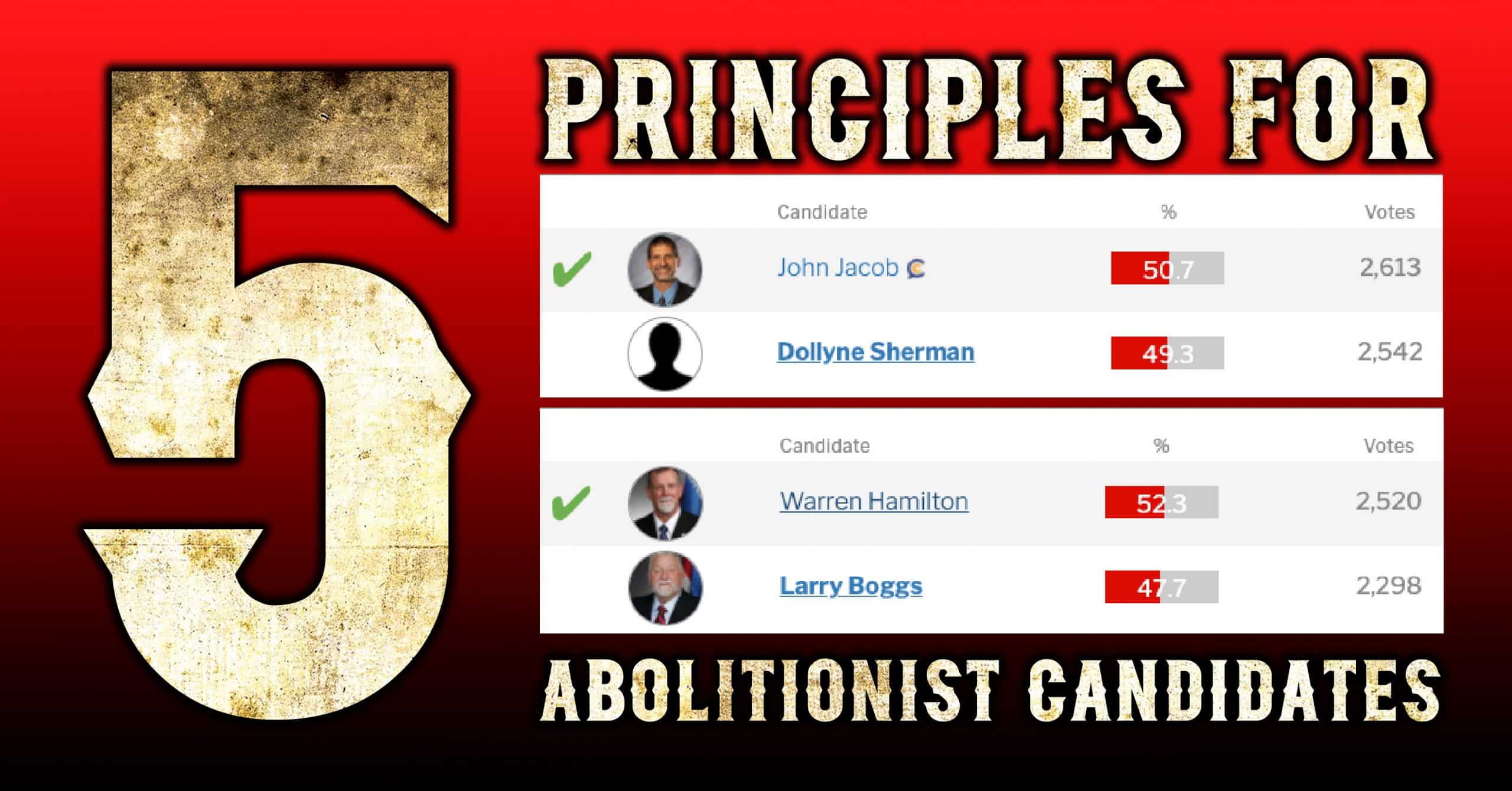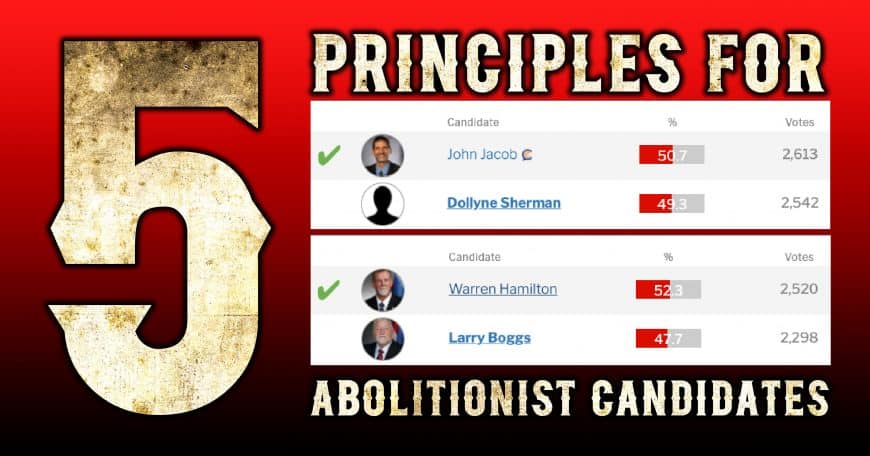
As the Abolitionist Movement grows, more and more bold Christians are stepping up to run for political office. This article will set forth a handful of principles by which these many abolitionist campaigns should operate.
This article is not intended to be a comprehensive guide for running a campaign; only a rundown of the basics of how to conduct your campaign as it relates to the specifics of an abolitionist campaign. If you have any questions about the various basic things you need to be doing as a candidate to get your message out, or about anything else related to running for public office, we recommend contacting former State Senator Joseph Silk at Liberty Rising Institute and Tim Gillespie, Pastor and Oklahoma Second Amendment Association Founder (timgillespieok@gmail.com).
1) You Must Outwork Your Opponent. By a Lot.
The Abolitionist Movement is rapidly growing in size and organization, but we do not have the resources of the Pro-Life Establishment. Especially if you are challenging an incumbent, your opponent will likely have more money than you, and will certainly have more political connections. In the 2020 Oklahoma SD7 race between incumbent pro-lifer Larry Boggs and abolitionist Warren Hamilton, most of the major Republican officials in the state united behind Boggs: the governor, both U.S. Senators, the Congressman from that area, and almost half the State Senate. They desperately did not want a man of courage like Hamilton in the legislature who was promising to introduce a bill to abolish abortion. Hamilton and organizations supporting him were out-spent by Boggs and Boggs-supporting organizations more than four-to-one.
At the same time, a similar situation was playing out in Indiana House District 93 where abolitionist challenger John Jacob was outspent more than two-to-one by incumbent pro-life Representative Dollyne Sherman. Sherman boasted the endorsement of Indiana Governor Eric Holcomb, as well as establishment organizations like Indiana Right to Life, the NRA, and the Indiana Chamber of Commerce.
But while Hamilton and Jacob were substantially outgunned in terms of funds and endorsements, they outworked their opponents. They and their campaign staff and volunteers called voters. They knocked on the front doors of most of the Republican voters in their district. While they didn’t raise as much money as their opponents, they raised enough to reach voters a number of times through mailers and social media ads. They put up signs and banners around the district. They attended local Republican events. They connected with other liberty-minded organizations (economic freedom, Second Amendment, medical freedom, family rights, etc.) to receive their endorsements and support. Both Jacob and Hamilton won the Republican primary and were elected to office in the general election.
As an abolitionist — and probably as a candidate that is generally more liberty-minded than your Republican primary opponents — you have a more powerful message that resonates with Republican voters. But you will not win the race if voters don’t know your message. You must work like crazy to get your message out.
2) Draw Contrast Between Your Campaign and Your Opposition
Reaching your voters is important, but to make the most of each point of contact with a voter, you must have messaging that distinguishes your campaign from your opponent’s. Every time a voter sees or hears from you, they need to immediately understand what you’re about and why they should vote for you instead of the opposition. You don’t get three hours to convince each person in your district of all your views. You get a few seconds to catch their eye or ear with something they like, and if you do that successfully, you’ll maybe get another few minutes to turn them into an active supporter. Everything you communicate must be clear, concise, and powerful. No wasted words. No milquetoast slogans. Strive for short, punchy language communicating a strong, moral stand.
As it relates to abortion, you need to make the point that while your opponent is running to regulate abortion — and thereby allow it — you are running to abolish it. Some good phrases to use on websites and other campaign materials are:
- Abolish Abortion
- Abolish, Not Regulate, Abortion
- Abortion Must be Abolished
- Equal Protection for Preborn Children
- Equal Justice for Preborn Children
- Equal Rights for Preborn Children
- Make _____ an Abortion-Free State
- End Abortion Now
- Protect All Preborn Children Immediately
Remember the importance of creating contrast. Avoid using phrases that make you blend in with your opponent and with the establishment that is keeping abortion legal. Don’t say things like:
- Pro-Life
- I Support Pro-Life Bills
- The life issue
- Any other vague or lukewarm language that could come just as easily from someone who opposes abolition as it could from someone who supports it
Drawing a line between abolitionism and pro-lifeism has long been a point of emphasis for the Abolitionist Movement. For well-meaning Christian pro-lifers to be able to become abolitionists, they first have to understand that there’s a difference between the ideology they currently hold to/the movement they currently support, and the ideology they should hold to/the movement they should support.
This principle is no less important in political campaigns. If anything, it’s more important. Creating contrast with your opposition is one of the first rules of campaigning. A campaign manual from the National Democratic Institute of International Affairs says: “Voters must make a choice between you and other candidates. You need to make it clear to the voters how you are different from the other candidates in the race by contrasting yourself with them.” Language is one of the best and easiest ways to draw contrast.
Almost all pro-life politicians use “pro-life” as a vague slogan to hide their compromise and apathy. “Pro-life” can mean anything or nothing at all. Almost none of the politicians using this language actually care about abortion. The very politicians keeping abortion legal will often tell you that being pro-life and “the life issue” are the reasons they got into politics in the first place.
Pro-life political messaging is a cesspool of meaningless generalities which serve to delay the abolition of abortion. Abolitionist candidates should not try to blend in with this cesspool. They should rise above it and expose the cesspool for what it is. Call out your opponent for hiding his or her compromise and regulation of abortion behind vague slogans, and be specific in telling voters that you are the strong anti-abortion candidate in the race: an abolitionist.
You might encounter political experts operating on traditional political wisdom who tell you that noncommittal, timid, status quo language is good for your campaign. They are wrong. That may have been the case 20 years ago, but it is not the case in today’s Republican party. Today’s Republican voters have no stomach for milquetoast smooth talkers. They are yearning for candidates who will speak clearly and strongly to important issues. They want abortion abolished. Not wishy-washy pro-life lip service.
As it relates to a platform specifically, there are five points to hit:
- The wickedness of the status quo
- The failure of compromising pro-life politicians
- Abortion must be abolished, not regulated
- Interposition against Roe v. Wade
- Equal protection for preborn children
An example, which candidates should feel free to use any part or the whole of:
More than 5,000 babies are murdered in Oklahoma every year with the approval of Oklahoma State law. This is a crime against humanity and I am not running for office so that I can pay lip service to the issue and pass do-nothing legislation like most pro-life politicians. I am running to establish justice for preborn children. I promise to author legislation immediately abolishing abortion and providing preborn children the equal protection of the law. It’s time to love our preborn neighbors as ourselves. It’s time to stop compromising with evil. It’s time to stop submitting to Roe v. Wade. It’s time to abolish abortion.
3) Don’t Be a One-Issue Candidate, But Also Don’t Downplay Abortion
There are lots of important political issues: school choice, economic freedom, family rights, gender sanity, freedom of speech, the Second Amendment, etc. You need to establish and communicate a just position on these topics. But all of these issues put together do not equal the seriousness and urgency of the abortion holocaust. It would be dehumanizing to preborn children to pretend that their mass murder is just another issue among many. You should address many topics well, but abolishing abortion should feature prominently in your campaign.
4) Do Not Agree to Anything Immoral
The pro-life establishment organizations will send you questionnaires. Most of them will ask whether you support pro-life bills which compromise with abortion. Do not agree to support these bills. We recommend that you ignore those particular questions or ignore the whole questionnaire.
It’s likely that pro-life groups are going to oppose you. The only way to definitely avoid that is to compromise, but that’s not an option. You don’t want to unnecessarily provoke them during a campaign, but if they get involved in the race to support your opponent (which is likely going to occur), then you must expose their reasons for supporting your opponents: namely, that the leading Pro-Life Establishment organizations are frauds which are actively opposing the immediate abolition of abortion, and that they will do everything they can to keep people who will fight to immediately abolish abortion out of office.
5) You Must Honor Christ
“God is sovereign” and “all of life is all about God” are not catch phrases for church services. They are actually true. We must act like it in all spheres of life. We cannot make sacred vs. secular distinctions. There is a view held by some Christians that politics is not about serving our Lord; that it’s simply the negotiation of power. They believe there is a fundamental difference between how Christians should act in the political sphere and how we should act in the rest of our lives; that we must set aside being prophetic in order to be politically effective. And just like that, the door has been opened to any number of compromised means to accomplish an end. Their conduct is no longer subject to principled criticism because they’re in the realm of politics which — in their minds — is not first and foremost about service to Christ. They’re now squarely in the paradigm of trusting in worldly pragmatism instead of providence. They have given up the fifth tenet of abolitionism and have ceased to be abolitionist.
All of life is about serving and glorifying Christ. You don’t get to carve out a piece of your life for yourself or even for a good cause outside of Christ. The reason we fight abortion is to love, serve, and obey Christ. Christ is due honor and service in everything: “So whether you eat or drink or whatever you do, do it all for the glory of God” (1 Corinthians 10:31). As Abraham Kuyper put it: “There is not a square inch in the whole domain of our human existence over which Christ, who is Sovereign over all, does not cry, ‘Mine!’”
God does not cease to be God in the political realm. He is the King of kings and Lord of lords. Governing officials are his servants. Further, His Word is no less powerful in the political realm. Abortion and pro-life incrementalism are sins, and the cure to sin is the gospel. As Pastor Dusty Deevers explained in his exposition of the five tenets of abolitionism at the 2021 Abolition Now Conference, we must not engage in sub-Christian strategies that do not hold the gospel as preeminent. Why would we look elsewhere? Where is the power to change culture? Where is the power to change politics? Where is the power to awaken the Church? Where is the power to abolish child sacrifice? It’s in the gospel.
This is not to say there isn’t room for strategic thinking. We should strive for effectiveness and efficiency. There are times to push and times to pull; times for direct confrontation and times for wise maneuvering; times for the hard truth and times for an encouraging word. We must pray for discernment in figuring out the right action for the situation. But any theory of politics that separates prophetic witness and service to Christ from our political endeavors 1) is unbiblical conduct, and 2) compromises effectiveness. Serve and honor Christ in all that you do.
We need to replace worldly compromisers who tolerate child sacrifice with bold Christians who will rescue those being led to slaughter. If you are considering running for public office, contact us here.
Three things to do!
- Big tech is cracking down on our ability to reach you! Our social media reach has been greatly decreased in recent months. To make sure you are not missing important content and news about abolition bills from Free the States, sign up for email updates!
- Be an activist! Convert people in your community to abolitionism. The best brief resource in the Abolitionist Movement for turning pro-lifers into abolitionists is the Are You An Abolitionist pamphlet. The best quadfold for outreach to pro-aborts and evangelism is the Abortion is Murder And Everybody Knows it quadfold. You can pick up copies from the Free the States store, along with t-shirts, drop cards, stickers, and activism signs!
- Everything we produce is possible because of the support of our donors. Help fund the fight to abolish abortion! Help us add staff and expand our programs by becoming a monthly supporter of Free the States!



